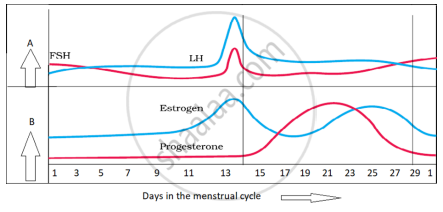Advertisements
Advertisements
Question
Write the answers to the following questions by observing the figure below.

- What does the figure above show?
- Which organs are involved in this process?
- Which hormones are involved in this process?
- After how many days do these changes happen again?
- Explain your opinion about the statement that a woman's body is impure while the above process is going on.
Solution
- The given figure represents the menstrual cycle in females.
- Uterus and ovaries are involved in menstrual cycle.
- Menstrual cycle is controlled by four hormones: follicle stimulating hormone (FSH), luteinizing hormone (LH), estrogen and progesterone.
- After at an interval of every 28-30 days changes happen again.
- It is a long-standing myth in various cultures that menstrual blood is impure and that women who is menstruating are unclean and unhygienic. However, there is no truth to this myth as menstruation is a natural process in which endometrial tissue and unfertilized ovum are expelled through the vagina. The menstrual cycle is not something to be ashamed of and should not be considered as unclean or impure, rather women should be encouraged to keep themselves hygienic and cleaner as the bodily changes can make them more susceptible to infections. Hence, creating awareness in society regarding the taboo around menstruation is essential.
APPEARS IN
RELATED QUESTIONS
Explain the events that occur in a graafian follicle at the time of ovulation and thereafter.
Uterus, Parturition, Fertilisation, Gestation, Implantation.
Briefly describe the secretory phase of the menstrual cycle.
Complete the following sentences with appropriate word:
The human gestation period is about ____________.
How many pairs of testis are present in human male?
Explain the importance of cleanliness during the time of menstrual cycle in girls.
In the absence of fertilization, corpus luteum ____________.
Withdrawal of which of the following hormones is the immediate cause of menstruation?
Which one of the following is the correct matching of the events occurring during menstrual cycle?
Corpus luteum develops from ______.
A biology student after studying the different levels of hormones during the menstrual cycle was comparing 2 subjects (Patients). A table was created after looking at the levels of hormones A and B for Subjects 1 and 2. Read the information in the table and answer the question that follows.
| HORMONE A | HORMONE B | |
| Subject 1 | Shows a peak on the 14th Day of the menstrual cycle. | Falls down during the luteal phase. |
| Subject 2 | Shows a peak on the 14th Day of the menstrual cycle. | The level is maintained high in the luteal phase. |
Subject 2 has a higher level of hormone B, which is ______
Distinguish between pollination and fertilisation. Mention the site and product of fertilisation in a flower.
Draw a neat, labelled diagram of a pistil showing pollen tube growth and its entry into the ovule.
About which day in a normal human menstrual cycle does rapid secretion of LH (Popularly called LH Surge) normally occurs?
After ovulation the collapsed ovarian follicle shrinks and becomes filled with cell to form:
The menstrual cycle begins with ______
In the figure given below, parts A and B show the level of hormones which influence the menstrual cycle. Study the figure and answer the questions that follow:

- Name the organs which secrete the hormones represented in parts A and B.
- State the impact of the hormones in part B on the uterus of the human female during 6 to 15 days of the menstrual cycle.
Which of the following statement is correct?
Choose the odd one out from the following terms and name the category to which the others belong:
